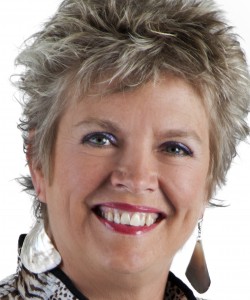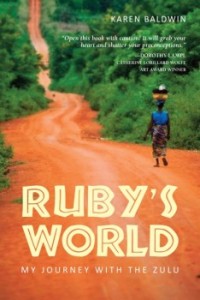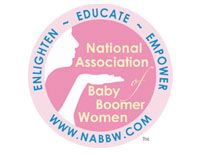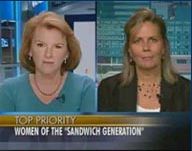Karen Baldwin is a true survivor. After besting the two major killers of women – a heart attack ten years ago, followed closely by breast cancer – she decided there must be a bigger purpose to her life than she had previously realized. Over the next five years, she made a number of major life changes: She left her career in engineering for a new one as an interfaith minister, and worked as a hospital chaplain.
 Eventually she listened to her dreams, and ventured off to South Africa, where she served three months teaching English to Zulu children in the rural, tribal village of Zinti.
Eventually she listened to her dreams, and ventured off to South Africa, where she served three months teaching English to Zulu children in the rural, tribal village of Zinti.
As she packs her bags full of books, and educational tools, and takes off for a stint as a volunteer in the South African province of Kwa-Zulu Natal — a single woman on a mission — she has no idea that she will shortly be calling upon her survival skills once again…
What she encountered in South Africa alternately filled her heart with joy — and terror. As she explains it, “At the end of my time, when they threatened me, I believed that if they killed me it would be by chopping me up in little pieces, and that no one would ever know what happened to me.
“I have since stumbled upon stories of that exact thing happening. One of the hardest things for me to reconcile in myself is the wide gap between the many ways that the Zulu are westernized, educated and modern … and the ways that they cling to their brutal tribal ways.”
Karen lived with a Zulu family, but not the mud hut, she’d anticipated. Her host family, the Ndlela’s, is a modern one, consisting of Ruby, one of the teachers at the rural Zinti school; her husband, Mhambi, a magistrate who enjoys eating dinner in the living room while watching televised soccer; plus their son, a nephew, and Mhambi’s mother, who happens to be the matriarch of the entire Ndlela family.
The Ndlela’s live in the suburbs of Pietermaritzburg, where Karen discovers rows of modest brick houses with manicured lawns lining wide streets. That’s also where Mhambi parks his gold Lexus in the driveway.
The “brick houses,” she eventually learns, were originally constructed for the colonials who settled in the area. After the fall of Apartheid, many of the whites fled, leaving behind these homes which were then “distributed” to the Zulus who moved from the rural areas to the towns.
Karen doesn’t get to live in the “brick house,” with the family, however. Instead, they provide her with her own private quarters: A small concrete “bunker” in their back yard, with no bathroom or kitchen facilities — the home’s original servants’ quarters. Thankfully, she is allowed to take her meals — and use the bathroom — in the main house.
But this is just the first of the culture shocks Karen experiences. The rest of them fill this book, making it a memoir that reads like a suspense thriller. In short, she is first welcomed and paraded around, then encounters a stunning resistance to change by the very people who had invited her. Simultaneously, she also discovers a number of similarities between Zulu and American families’ joys, pains, deception and love.
Once you read it, you’ll find that this is one of those books that will not leave you alone. It’s a roller coaster of an experience — honest, moving, frequently funny, sometimes startling, and always compelling. Karen tells her story in journal style, allowing the reader to experience her time there exactly as it unfolded for her.
After reading “Ruby’s World,” I contacted Karen, and asked her to tell me more about her experience.
Here, in her own words, is what she told me:
Did you always anticipate writing a book about your experience?
NO. Absolutely not. I intended to go the first time for three months to help the teachers with English lessons, then go back once a year for a month to keep it up. 
When I first got home, my shame around failure was so enormous that I didn’t talk much about what happened. When I finally started to share stories, people would often tell me I should write a book.
Since I had never written before, that felt pretty absurd. But the experience wouldn’t leave me alone … it began to feel like it was a story that “demanded” to be told, so I undertook the process of writing “Ruby’s World.”
One thing I know I am curious about, is how did you locate the opportunity to teach at the Zinti school? As you were not sponsored by any religious or outreach organization, and I’ve read that the your decision to go as the result of prayer – I’m curious as to how you became aware of the opportunity.
I know you mention someone named Leslie set you up, but can you elaborate on how you knew Leslie, who she was and how she knew of the opportunity?
My decision to go was based on a series of dreams that I had in response to asking to be shown a direction / path / purpose for my life after surviving cancer. The dreams clearly placed me in Africa.
I’ve written more about this in my second book ‘Unlocking the Dream.” It’s a short story that details these dreams and the path that got me to Africa.
When I finally “agreed” with my dreams that I would travel to Africa, I sent out a message to everyone in my email contact list – about 220 people at the time – asking if they knew of anyplace in Africa that could use my help. I knew I wanted to work with children.
An acquaintance of mine, unbeknownst to me, had recently been in South Africa on a safari. While there, she stumbled upon the Zinti school, spoke with the principal and teachers about their dreams for the kids, and filmed them talking about their greatest desire being a teacher who spoke English as a first language to help the kids with their English lessons.
Leslie (not her real name) and I talked, I watched her video (about a hundred times), she put me in touch with the Principal of the school, and the rest is history!
What sort of research about your destination and the Zulu people and their culture did you do before you left for South Africa? Was it helpful? Was it enough? As I read the book, it seemed to me that some of the cultural stuff, like the practice of scarification seemed to take you by surprise.
The research I did was primarily talking with Leslie about the experience she had had with the rural village where Zinti is.
I was very aware of the inequities between men & women, the reality of children and wives being “property,” that most men have more than one wife, the poverty, AIDS, rampant teen pregnancy, and the potential for “old traditions” to still be practiced.
I also spoke with one of my hospital colleagues who has ties to South Africa, who confirmed Leslie’s perspective.
Common belief among Americans who had traveled to South Africa was that most of the practices of mutilation had dwindled since the fall of Apartheid. So the infant scarification and female genital mutilation did take me by surprise.
I don’t think I would have been so taken back had it been a thing of the past that was talked about … but that it is current … and that the elders are so proud of the traditions, really got to me.
The other thing I observed about myself is the difference between having an intellectual knowledge of the reality of life there, and being a witness in the midst of their culture.
It was emotionally challenging to FEEL their struggles and become so aware of the complexity of the issues … especially the FGM (female genital mutilation). It was nearly unbearable to imagine that these women willing submit their daughters to this practice because it is their BEST choice.
Talk a bit about the kids you taught. If you could go back and tell them anything now, what would that be?
This question makes me cry. These kids are amazing. Despite the fact that they have nothing … including very little hope for creating a different kind of future … they show up every day eager to learn.
- They laugh and play so readily.
- They are so happy with so little.
- They love their music and dance.
- And they want affection. I never once witnessed an adult show affection to a child … even when the little boy had been killed on the side of the road, no one physically consoled the kids.
If I could tell them anything, it would be that they have inspired me more than they could ever realize. I think of them daily. I hope they stay in school and keep learning … that learning just for the sake of learning is valuable.
And I would tell them that I love them, that if they ever have a chance to contact me in the future … I would be so happy to hear from them.
And that if I could (seems unlikely because of issues of personal safety) I would come back to see them in a heartbeat.
Speaking of going back — would you consider going back to teach again in South Africa – and specifically to the Zinti School?
There is an excellent chance that I’ll travel back to South Africa to work with the Rural Women’s Movement of South Africa. Specifically compiling and editing an anthology of their life stories to publish here in the US … a way to give them a voice that they wouldn’t otherwise have … a powerful healing tool.
There is also a non-profit I’ve been in touch with that built a school in KwaZulu-Natal and would like to produce bi-lingual books for the kids to improve their ability to learn English. I’ve been talking with this non-profit about going to their school to collect the kid’s stories.
Although I would love to go back to Zinti … I’d love to see Missy, Pamela, the kids … even Ruby.
But it seems unwise at this point, since I really don’t know that I’d be safe. I don’t know what has transpired on their side since I left. Without knowing how the witch doctors and tribal indunas feel about me, it seems risky.
It’s possible that the RWM would be willing to escort me out there … but I really don’t know.
Another possibility that several film producers have looked at my book. If that transpires .. I’d love to go back for the filming, and feel that that would provide the greatest security for me.
Your experiences with Ruby were so wide-ranging. Sometimes you two were like sisters and sometimes it seemed that there was no common ground between the two of you. Given what you learned of her life, what would you say that you most respect about the Zulu women?
You’re absolutely right. It felt like Ruby and I vacillated between being sisters and strangers. I grew to respect the strength of these women, and the support that they provide for each other.
Before I went, I expected their lives to be slow paced with time for “old, wise, reflections on life.” Some fantasy picture of what village, tribal life would be like.
But exactly the opposite was true. Their lives are packed with modern day issues of survival combined with tribal customs that are demanding on their lives, and the reality of living in a culture where death is in your face every day.
I don’t know how they keep up the pace. It was exhausting. And they seem to show up for each other in supportive ways without trashing their culture or each other for things that American women would be busy trying to “fix” for each other.
Toward the end of the book, at the “coffin party,” you met two white South African videographers from Durban. These men said they always traveled in pairs for safety. Given what you now know, do you think this is good advice?
Absolutely fantastic advice!!! I would never go back alone. At the time, I assumed their attitude to be about their Apartheid conditioning – racism. Now, especially after being involved with South African ex-pats and the RWM … I believe their concerns are justified and that they were rightfully worried for me.
Have you heard from anyone in/from South Africa who has read your book? If yes, what do they have to say about your story?
Many people from South Africa have read my book. The first thing they all say is that I am lucky to be alive.
The second thing the white South Africans say is that I have “put their country to shame.” They seem to be in agreement that I somehow single-handedly accomplished that they all talk about, but are unwilling to do: help the Zulus by stepping across the race barrier.
As far as I know, very few Zulus have read my book … but those that have seem pleased that I have represented their culture fairly and that despite the way it ended, that I am willing to continue working for their benefit.
Do you have any regrets about your experience?
The only thing I regret was taking apples to school for homework rewards when the teachers were starving the kids.
I had promised myself before I went that I would not purposely interfere in their culture. I broke my promise with those apples.
It was just too painful to see the kids suffer when it seemed like it didn’t have to be so. The experience of starving them also pushed some very old buttons from my childhood of not having enough to eat.
Other than the “apple incident” I think anything else I did that may have been interference, was completely innocent on my part.
What is the biggest lesson you learned from your Zinti experience?
Wow. Big question. Here’s a list of lessons learned:
- There is a difference between being friendly and being friends
- Deep traditions must be respected even if they aren’t understood
- Having an open heart will allow you into places that you couldn’t otherwise go
- It’s possible to make a difference … but maybe not in the ways you expect
- Everyone wants to be loved and accepted
- There is a huge difference between being “educated” and being “modern”
- No effort is wasted
- The human heart is so resilient
How long did it take you to recover your equilibrium once you returned to the US?
A long time! I beat myself up for at least 3 or 4 months for being what I considered a total failure at something as simple as helping kids. After 6 months or so I began to accept the possibility that there was a positive experience in the mix for both them and myself – even if I couldn’t see what it might be.
My deep healing took place during the writing of “Ruby’s World.” It was a painful process to relive every experience. I cried buckets.
Some of my pain was about how naive I was, that I was so blind to what was going on around me. Some tears were about the ways I felt guilty that perhaps I had unintentionally hurt them. Some tears were simply about feeling so helpless in my desire to contribute and make a difference.
Months after the book was published, I began to have South African ex-pats show up at my book signing events. They were able to validate some of the theories in my epilogues, and shed tremendously helpful light on the Zulu culture for me.
Then, in July of this year, I was put in contact with the Rural Women’s Movement of South Africa, that appointed me as their first American Ambassador.
THAT, was incredible … a sense that the entire story has come full circle. In the spring of 2013 I’ll meet their Executive Director at the United Nations where we will together address the Commission on the Status of Women and present workshops for other attendees.
Finally, what would you advise anyone now, if they told you they had a dream that told them to go to South Africa to teach English to native children?
Examine your intentions … then follow your heart.
 Get E-Mail Updates
Get E-Mail Updates 









